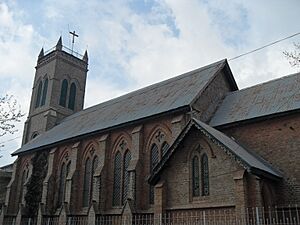Church of Pakistan facts for kids
Quick facts for kids Church of Pakistan |
|
|---|---|

Logo
|
|
| Classification | Protestant |
| Orientation | United Protestant |
| Polity | Mixed polity with episcopal and presbyterian elements |
| Moderator | Azad Marshall |
| Associations | World Methodist Council, Anglican Communion, World Communion of Reformed Churches, Christian Conference of Asia World Council of Churches |
| Origin | 1970 Pakistan |
| Merger of | Anglican (Church of India, Burma and Ceylon), Presbyterian (Church of Scotland), Lutheran, Methodist |
| Separations | Church of Bangladesh (1974) |
| Members | 500,000 |
| Ministers | 600 |
The Church of Pakistan is a Christian church in Pakistan. It was started in 1970. This church brings together different types of Protestant Christians. It is part of big Christian groups like the Anglican Communion and the World Methodist Council.
Contents
History of the Church
The Church of Pakistan was formed in 1970. It brought together several Christian groups. These included Anglican, Presbyterian, Methodist, and Lutheran churches. It is the only united Protestant church in South Asia that includes Lutherans.
The church helps train its leaders. It has two special schools for this. These are the Gujranwala Theological Seminary and St. Thomas' Theological College, Karachi.
Women in Leadership
The Church of Pakistan began allowing women to serve as deacons in 2001. Deacons are church leaders who help with services and community work. However, the church does not currently allow women to become priests or bishops.
Church Regions (Dioceses)
The Church of Pakistan is divided into different regions called dioceses. Each diocese has a bishop who leads it. Here are the main dioceses:
- Faisalabad (Bishop: Aleem Anwar Gill)
- Hyderabad (Bishop: Bishop Kaleem John)
- Karachi (Bishop: Frederick John)
- Lahore (Bishop: Nadeem Kamran)
- Multan (Bishop: Leo Roderick Paul)
- Peshawar (Bishop: Humphrey Peters)
- Raiwind (Bishop: Azad Marshall)
- Sialkot (Bishop: Alwin John Samuel)
The Diocese of Sialkot is part of the World Communion of Reformed Churches. The whole Church of Pakistan is now listed as a member of this group. The Sialkot diocese has over 40,400 members. They meet in 44 congregations and 28 smaller house groups. This diocese follows important Christian beliefs. These include the Apostles Creed and the Nicene Creed.
After the church united in 1970, it had four dioceses. These were Multan, Lahore, Sialkot. In 1980, four more were created. These new ones were Hyderabad, Raiwind, Faisalabad, and Peshawar. By 2013, there were eight diocesan bishops. There was also a bishop for ministries in the Gulf region.
Raiwind Diocese

The Diocese of Raiwind is one of the eight dioceses. It was formed in 1980. This was 10 years after the church union. The diocese mainly covers rural and semi-urban areas. Its main office is in Lahore.
The Raiwind diocese has over 26,000 members. They meet in 38 congregations. The diocese also runs 11 schools. Its main work includes caring for people. It also runs village schools and Sunday schools. They work on peace-building and helping poor children. They also support young people and women.
Church Connections
The Church of Pakistan is part of a group called the Global South (Anglican). This group connects Anglican churches around the world. Some bishops in the Church of Pakistan support another group called GAFCON.
In 2014, Bishop Humphrey Peters attended a meeting in Florida, USA. This meeting was for bishops of the Anglican Church in North America. Bishop Azad Marshall of Raiwind is a key leader for GAFCON in Pakistan. He attended a GAFCON meeting in Dubai in 2019.
In November 2019, Archbishop Foley Beach visited Pakistan. He met with Moderator Humphrey Peters and Bishop Azad Marshall. He also met with Muslim scholars during his visit. In 2021, Bishop Marshall was chosen as the new Moderator Bishop. This brought the Church of Pakistan closer to the Anglican realignment movement.
See also
- Christianity in Pakistan
- Christianity in India
- Ancient Christianity in the Indian Subcontinent
 | James Van Der Zee |
 | Alma Thomas |
 | Ellis Wilson |
 | Margaret Taylor-Burroughs |

